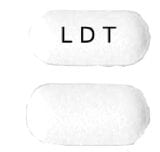Uses
Telbivudine is used for chronic (long term) hepatitis B infection (swelling of the liver caused by a virus) in people who may also show signs of liver damage. Telbivudine is in a class of medications called nucleoside analogues. It works by decreasing the amount of hepatitis B virus (HBV) in the body. Telbivudine does not cure hepatitis B and may not prevent complications of chronic hepatitis B, such as cirrhosis of the liver or liver cancer. Telbivudine does not prevent the spread of hepatitis B to other people through sexual contact, sharing needles, or contact with blood.
Side Effects Of Telbivudine
Telbivudine may cause side effects. Tell your doctor if any of these symptoms are severe or do not go away:
- headache
- diarrhea
- back pain or joint pain
- difficulty falling asleep or staying asleep
- itching
- rash
Some side effects can be serious. If you experience any of these symptoms or those listed in the WARNINGS and PRECAUTIONS section, call your doctor immediately:
- muscle aches, pain, weakness, or tenderness
Telbivudine may cause other side effects. Call your doctor if you have any unusual problems while taking this medication.
Warnings & Precautions
Before taking telbivudine:
- tell your doctor and pharmacist if you are allergic to telbivudine or any other medications.
- tell your doctor and pharmacist what other prescription and nonprescription medications, vitamins, nutritional supplements, and herbal products you are taking or plan to take. Be sure to mention the medications listed in the WARNINGS and PRECAUTIONS section and any of the following: chloroquine (Aralen);erythromycin (E.E.S., E-Mycin, Erythrocin); fenofibrate (Antara, Lofibra, Triglide); gemfibrozil (Lopid); hydroxychloroquine (Plaquenil); medications to prevent rejection of a transplanted organ, such as cyclosporine (Neoral, Sandimmune) or tacrolimus (Prograf); medications to treat fungal infections such as fluconazole (Diflucan), itraconazole (Sporanox), ketoconazole (Nizoral), posaconazole (Noxafil), or voriconazole (Vfend); oral steroids such as dexamethasone (Decadron, Dexone), methylprednisolone (Medrol), and prednisone; (Deltasone), penicillamine (Cuprimine); probenecid; or zidovudine (AZT, Retrovir, in Combivir, in Trizivir). Your doctor may need to change the doses of your medications or monitor you carefully for side effects.
- Tell your doctor if you have or have ever had a liver transplant (surgery to replace a diseased liver), or kidney disease.
- Tell your doctor if you are pregnant, plan to become pregnant, or are breast-feeding. If you become pregnant while taking telbivudine, call your doctor. Do not breastfeed while you are taking telbivudine.
- If you are having surgery, including dental surgery, tell the doctor or dentist that you are taking telbivudine.
Dosage Of Telbivudine
Telbivudine comes as a tablet to take by mouth. It is usually taken once a day with or without food. Take telbivudine at around the same time every day. Follow the directions on your prescription label carefully, and ask your doctor or pharmacist to explain any part you do not understand. Take telbivudine exactly as directed. Do not take more or less of it or take it more often than prescribed by your doctor.
Ask your pharmacist or doctor for a copy of the manufacturer’s information for the patient.
Other
Keep all appointments with your doctor and the laboratory.
Do not let anyone else take your medication. Ask your pharmacist any questions you have about refilling your prescription.
It is important for you to keep a written list of all of the prescription and nonprescription (over-the-counter) medicines you are taking, as well as any products such as vitamins, minerals, or other dietary supplements. You should bring this list with you each time you visit a doctor or if you are admitted to a hospital. It is also important information to carry with you in case of emergencies.
Source
All information has been provided courtesy of MedLinePlus from the National Library of Medicine and from the FDA.



